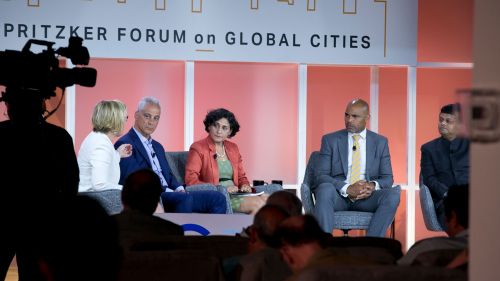Mind the Knowledge Gaps: What Global Conferences Bring to Light

Convenings of experts call attention to that which scientists and policymakers don’t know. These "knowledge gaps," it turns out, are especially prevalent in the urban domain.
Global Conferences
Big gatherings love affirmative knowledge. Pithy tweets, engaging slides, even lengthy reports all tend towards the breaking, or at least sharing, of new knowledge. The recent Pritzker Forum on Global Cities was no different: Steve Case detailed the geography of venture capital; Sheba Crocker outlined emerging and historical processes for institutional change at the United Nations; and Aromar Revi laid out just how quickly, and how widespread, climate action has to be.
But just as importantly, such convenings of experts call attention to that which scientists and policymakers don’t know, to areas or issues that need further thought and research. These "knowledge gaps," it turns out, are especially prevalent in the urban domain. If global leaders, national and subnational, are to address global challenges, ambitious policy agendas need to be coupled with ambitious research agendas.
Consider Revi’s intervention at the Forum, which in fact, was drawn from his work on the Intergovernmental Panel on Climate Change (IPCC), the international community’s most esteemed body of scientific experts on climate change. The IPCC’s Fifth Assessment Report (AR5), released in 2014, and Special Report on Global Warming of 1.5°C (SR1.5), released in 2018, remain the go-to reference sources for climate science. The reports include input from scores of scientists, and with their thousands of footnotes and rigorous process, make evident the existential threat posed by climate change. In this era when data, science, rigor, and fact are under attack, the IPCC offers a rather obvious lesson.
But the IPCC also provides an example in its willingness to recognize the areas that need more research. Given the massive amount of data available and the significant attention being paid to cities, the Executive Summary of AR5’s Human Settlements chapter can’t but strike many as remarkable:
"This assessment highlights a number of key knowledge gaps. First, there is lack of consistent and comparable emissions data at local scales, making it particularly challenging to assess the urban share of global GHG emissions as well as develop urbanization typologies and their emissions pathways. Second, there is little scientific understanding of the magnitude of the emissions reduction from altering urban form, and the emissions savings from integrated infrastructure and land use planning."
The paragraph includes four more knowledge gaps, including “large uncertainties about future urbanization trajectories.”
These flagging exercises are not merely academic. They are, in a sense, political. By highlighting gaps, authors lend credibility to the science therein and reaffirm the rigorous peer-review standards of IPCC reports. They are also, implicitly, instructive, helping guide research in the scientific community, a great deal of which is increasingly focused on urban spaces.
Not unlike IPCC reports, the Pritzker Forum brought some knowledge gaps to the fore, and in particular those at the intersection of global trends and local governance.
In the arena of global governance, New York City and Helsinki made clear they will deliver voluntary local contributions for Agenda 2030 and the Sustainable Development Goals at the United Nations’ High Level Political Forum this year. And they will continue to work diplomatically to encourage other cities to do so. But they readily admit, that explaining UN agreements and processes to local constituencies remains a political challenge. And even then, as Habitat Commitment Project has shown, contribution comparability will require new knowledge structures, something that such contributions may in fact help build.
The movement of the mass majority of migrants into urban spaces continues to demonstrate knowledge gaps. Here, too, questions persist around data analysis, politics and policy. As thousands of cities work to prepare for and integrate migrants, questions of pull-push factors persist, and with them what can be expected in terms of numbers. What is more, the global political landscape around migrations remains less well-charted than other crises, such as climate change. The political points of pressure on which city halls should be focused—whether in international organizations or national capitals—remain to be charted.
And in terms of global opportunity, Steve Case made clear the entrepreneurial creativity that exists in cities across the United States, and JT Kostman argued that artificial intelligence can help such cities prosper. But Case also attested to the lack of knowledge many city halls possess regarding their startups, and the geography of employment in the wake of widespread use of artificial intelligence remains a significant unknown. (A number of business leaders in Chicago, for example, recently pivoted their strategy around local tech incubation.)
In the end, despite the vast amount of research and data available, it shouldn’t be surprising that large gaps in urban knowledge persist. After all, there are many cities—according to the IPCC and UN data, there are around 1000 urban agglomerations with populations of 500,000 or greater—and cities remain difficult to know. We need to continue to gather in multi-sector fora to build knowledge, and when we do so, to share knowledge gaps so that we might fill them in the year and years to come. Only through this process will we identify effective solutions to respond to this evolving world.

